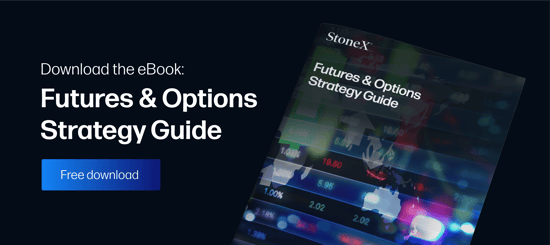One of the greatest advantages afforded to traders who actively engage the futures markets is the ability to satisfy a wide range of objectives or goals. From actively managing the degree of risk facing an investment portfolio to speculating on forthcoming asset pricing volatilities, futures trading offers many diverse opportunities and benefits to market participants. Let’s examine three major types of trades.
What Is a Basis Trade?
A basis trade is classified as being an “arbitrage” strategy, meaning the goal of the trade is to capture profit from the inconsistent pricing of multiple related futures contracts.
In order to conduct a basis trade, opposing positions are taken in the markets of two or more similar futures contracts. As the markets move towards equilibrium, profit is realized as the original discrepancy in pricing is corrected. Typically, gains attributable to basis trading are made through small moves in pricing, thus the need for employing high degrees of leverage.
Basis trading is a common practice in the futures commodities markets because derivative products are readily traded against each other as well as in conjunction with their underlying assets. In addition to commodities, basis trades typically involve contracts based upon debt instruments, currencies or equities indices.
Any trades are educational examples only. They do not include commissions and fees.
What Is Spread Trading?
For traders interested in reducing the risk associated with taking an exclusively long or short position in a given futures market, conducting a spread trade is an attractive alternative.
Spread trading in futures is the practice of taking both a long and short position in the same or correlated market. The objective of spread trading is to capture profit arising from incongruent pricing volatilities facing similar contracts with common or unique expirations.
There are six basic classifications of spread trades:
- Intra-commodity: Opposing positions are entered on the same product
- Inter-commodity: Opposing positions are entered different products
- Intra-exchange: Positions are opened on the same exchange
- Inter-exchange: Positions are opened on different exchanges
- Intra-delivery: Involved contracts have a common expiration
- Inter-delivery: Involved contracts have different expirations
Spread trading provides several distinct advantages to the futures trader. Tight risk controls, standardized order-entry, and substantially reduced margin requirements are a few attractive aspects of implementing a spread-trading methodology.
What Is Hedging?
Hedging is the practice of taking an offsetting position in an inversely correlated product or market to mitigate risks attributable to a downturn in asset pricing. While the primary goal of hedging is to limit risk, it may also be used to lock in a guaranteed profit or preserve the value of a hard asset.
There are many ways to engage in hedging activities, most of which depend upon the asset-class and overall function of the trading operation:
- Diversification: Hedging with futures can be useful in the diversification of an investment portfolio. For instance, if a portfolio is primarily long equities, a short position may be taken in an equities futures product to lock in profit and insulate against a widespread market downturn.
- Speculation: Futures traders often engage in hedging practices to protect a short-term speculative position. Taking positions in markets that are inversely correlated is a common way of managing broader systemic risk while preserving the integrity of an existing strategy or open position.
- Producer-oriented risk management: Producer hedging is the most traditional form of risk management. For instance, in the event that a commodity producer desires protection from adverse pricing facing the upcoming delivery of a product, a short position may be taken in a corresponding futures market. If price of the commodity goes down, the losses sustained by the producer will be offset by gains established from the short position in the futures market.
Seeking the Proper Guidance
In futures, there are a vast number of possibilities when it comes to conducting trading operations, each driven by a specific methodology and goal. The principles outlined in hedging, basis and spread trading are some of the most frequently applied by market participants attempting to gain market share.
However, implementing the proper type of trade at the optimal time is typically a complicated endeavor. The guidance of an experienced market professional can provide the insight and framework necessary for successful integration of basis, spread and hedge trading into a comprehensive trading approach.



